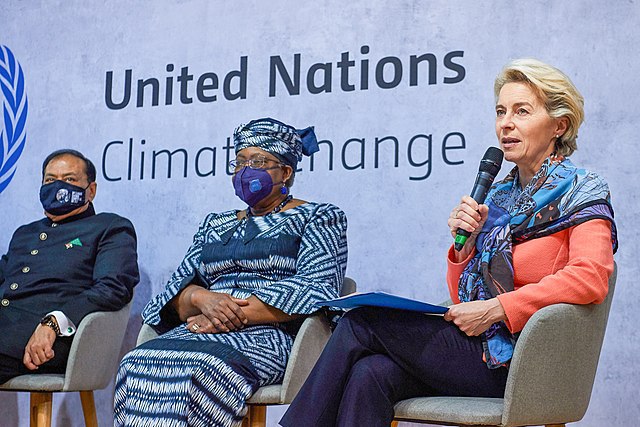The Conference of Parties is the world’s largest climate conference. It has met once a year since 1995 when it was first held in Berlin, Germany. It was created by the United Nations Framework Convention on Climate Change (UNFCCC) as a response to the rising issues caused by climate change. It meets in a different country each year with the goal to present solutions to fight climate change. It also attempts to bind countries to agreements on reducing their carbon gas emissions. Additionally, it lets countries report whether they have followed through on their climate commitments.
The most prominent goal ever set by the COP was established at COP21 in Paris in 2015. The Paris Climate Agreement agreed that every country needed to work together to limit a global average temperature increase of 2°C, preferably to 1.5°C, in comparison to pre-industrial levels.
COP is critical to the entire world because it highlights the significance of a global commitment between countries as climate crises accelerates rapidly. Global temperatures rose by 1°C between 1901 and 2020, and CO2 levels have risen by 25% since 1958. By 2030, 700 million people may be displaced due to drought.
Despite the dire rate of global climate change, multiple European Union countries, faced with Russia’s invasion of Ukraine, have been turning back to coal plants to compensate for the lack of Russian-supplied gas, which only further exacerbates global warming and makes this year’s COP even more crucial.
COP27 is being held from Nov. 6 to Nov. 18, 2022 in Sharm el-Sheikh, Egypt. Hosted by President Abdel Fattah El-Sisi and the Egyptian government, it will host 2,000 speakers with over 35,000 expected participants. Its vision is to “achieve as much progress as [possible]across the board on every item under negotiations in a balanced and principled manner… [basing all of the work]on the most reliable, credible science available… [ensuring]that no country… is left behind through building mutual trust….”
How environmentally friendly is the event?
Sharm el-Sheikh is a resort city on the Red Sea Coast that has been turned into a green city with a $7 million grant from its partner, the UNFCCC. The city has adopted eco-friendly practices, including the use of renewable energy, water conservation and certifying the majority of their hotels as Green Star officiants, which deems them environmentally friendly. Additionally, the city has implemented electric energy for electric and natural gas buses as transportation for the conference. The Egyptian government also added more green spaces to the city, banned single-use plastic bags and relocated smokestacks from within the city to the desert.
What are the key challenges for negotiations at COP27?
The Egyptian government has organized panels over multiple days of the conference to cover a wide range of issues. They have listed four main goals: mitigation, adaptation, finance and collaboration. These goals encompass limiting the global average temperature rise to 1.5°C, minimizing damage from climate disasters and investing in infrastructure to prevent major damage, creating more transparency of climate finance including with the annual USD $100 billion provision for climate action in developing countries provided by the wealthiest nations and ensuring that governments work together to follow through on their commitments.
COP27 is facing a new host of challenges presented by climate change. The conference will likely set up formal arrangements for receiving funding after damage caused by climate change, which China and the Group of 77, a coalition of developing countries, requested be addressed and formalized. If this framework for loss and damage compensation is not agreed upon and developed, it is likely that negotiations of the adaptability goal will not reach a consensus at COP27.
At COP26 in 2021, wealthy countries agreed to double finance from the agreed-upon 2019 amount of funding to developing countries for adaptation to $40 billion by 2025, but many countries are calling for more than $40 billion, saying that more financing is required to adapt to climate change and curb emissions.
COP27 will revisit countries’ emissions targets, also known as nationally determined contributions (NDCs), to keep in tandem with the Paris Climate Agreement’s goal of limiting the average temperature rise to 1.5°C. This means that India, Egypt, the United States and China, among other large emitters, will have to expand their targets and commit to curbing their emissions more.
What to look out for at COP27?
This year, the Conference of Parties wants to prioritize follow-through. One of the largest issues in combating climate change is the lack of countries fulfilling their commitments. This can be seen with former U.S. President Donald Trump exiting the Paris Climate Accord in 2020 (although President Joe Biden subsequently rejoined on his first day in office). One goal of COP26 was to provide climate financing for developing countries to adapt to climate change disasters, with $100 billion per year allotted to developing countries. However, the negotiating countries never decided how to measure and report the countries’ financial pledges. The Organization for Economic Cooperation and Development (OECD), reported that the countries who pledged money did not reach $100 billion, but instead only a measly $356 million. Furthermore, it is clear that much more financing is needed to adapt to climate change, meaning that even meeting the $100 billion goal is not enough.
A key question at COP27 will be how developed countries will address the needs of the Group of 77 in how these countries adapt to climate change and mitigate damage caused by climate disasters, particularly because climate change affects developing countries disproportionately.
Ultimately, COP27 negotiations must simultaneously meet the demands of vulnerable developing countries and establish NDCs that developed countries will commit to. Striking this balance will be a challenge, but as temperatures increase and the world hurdles closer to climate fallout, this year’s COP27 consensus will be crucial to navigating impending climate change.







